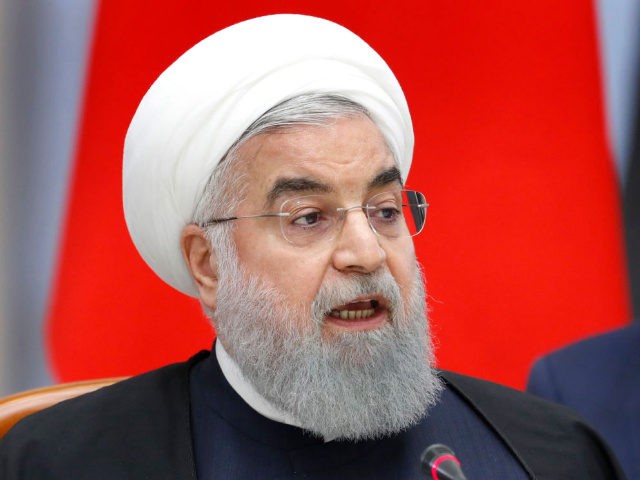Iranian President Hassan Rouhani said on Wednesday that negotiations with the United States might be possible if Washington lifts sanctions against Iran.
His remarks might not represent a sea change in Iran’s position, but they are at least stylistically different from the string of Iranian officials who have declared negotiations are impossible under any circumstances.
“Whenever they lift the unjust sanctions and fulfill their commitments and return to the negotiations table, which they left themselves, the door is not closed. But our people judge you by your actions, not your words,” Rouhani said on Iranian state television, only a day after the Iranian Foreign Ministry’s latest insistence that negotiations are unthinkable.
Rouhani made similar comments during a meeting with his cabinet on Wednesday, saying the door will be open for talks if the United States “chooses another way and returns to justice and law.”
“The road is not closed for them, whenever they put aside their cruel sanctions and return to the negotiation table that they left,” he told the cabinet.
He spoke on the occasion of “Quds Day,” Iran’s annual celebration of “resistance” against Israel. Al-Quds is the Arabic name for Jerusalem. Iran’s notorious Islamic Revolutionary Guard Corps (IRGC), recently labeled a foreign terrorist organization by the United States, has a unit dedicated to espionage on foreign soil known as the “Quds Force.”
Rouhani declared Iran will “never leave Quds and the oppressed alone,” by which he meant Iran will never halt the destabilizing activities opposed by the United States, including its support for the brutal Houthi insurgency in Yemen and the Assad dictatorship in Syria.
“Palestine and Quds are code names for the resistance of all Muslims, and Israel is the code name of oppressors in the world who want to oppress Muslims,” Rouhani said.
“There was a time when the Palestinians used to defend themselves only with rocks and stones, but today, they have worked hard and developed a tool to give powerful responses to Israelis. Today, Palestinians respond missiles with missiles, in a way that after 48 hours, the Zionists were forced to retreat and their Iron Dome could not tolerate their missiles,” he boasted.
Rouhani was endorsing a savage rocket attack launched against Israeli civilians by Palestinian terrorists at the beginning of May. Iron Dome is the Israeli anti-missile defense system. Palestinian terrorists were able to overwhelm the system by launching over 450 rockets in a single day.
“The enemies of Palestine and Quds have tried to undermine Quds’ sanctity over the past year and have declared al-Quds as the capital of the intruders and moved their embassy there,” Rouhani said, a reference to President Donald Trump’s decision to move America’s embassy in Israel from Tel Aviv to Jerusalem.
Iran’s intransigence on supporting terrorism and insurgencies is cited by supporters of Trump’s policy as a good reason to keep tough sanctions in place. The Washington Post reported this month that sanctions are choking off the money Iran needs to finance its sinister activities, forcing Iran-supported groups like Hezbollah to retire fighters, cut back on propaganda broadcasts, and slash programs that purchased political support from impoverished communities.
“Our sanctions are working and I think that you’ve heard Secretary Brian Hook and myself go through a litany of ways in which we know that the sanctions are quite effective for Iran,” State Department spokeswoman Morgan Ortagus told reporters on Wednesday.
Maintaining the level of sanctions pressure endorsed by Ortagus is not easy, although resistance from big Iranian oil customers like India has been more muted than critics feared. The Trump administration bet heavily on world oil markets absorbing the loss of Iranian products, and so far that bet is paying off. As of Wednesday, the oil industry was more concerned about another oil glut and price crash — triggered by the American oil industry’s astounding production — than a shortage.
China is one of the most unpredictable factors in the continuing success of U.S. sanctions on Iran. On Wednesday the government of semi-autonomous Hong Kong dismissed American warnings that it could face penalties if it buys oil from a tanker that allegedly violated American sanctions. Hong Kong said it would continue to obey U.N. Security Council resolutions but not “unilateral sanctions” imposed by “certain countries.”

COMMENTS
Please let us know if you're having issues with commenting.